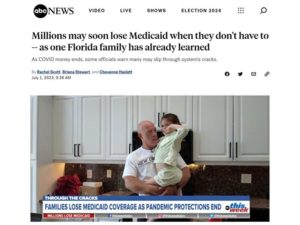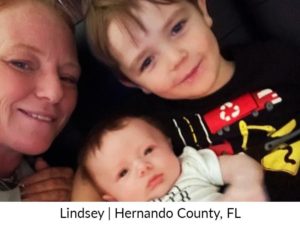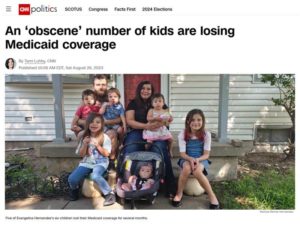This blog is part of our Working Better Together series and was authored by Miriam Harmatz, Founder and Director of Advocacy at the Florida Health Justice Project. This blog series is intended to provide our Health Law Partnerships with a platform to highlight successes, challenges, and innovative approaches to furthering health access and health equity in the states where they work.
The “Medicaid Experiences” project referenced in this blog series is a collaborative endeavor of the National Health Law Program and eight state-based legal aid organizations. The purpose is to better understand the direct experience of individuals as enrollees and applicants for Medicaid and advocate for improvements.
Note: The photographs featured in this blog are interactive and link to either an article or Florida Health Justice Storyteller page.
After the Medicaid continuous coverage requirement ended in March, states began the “unwinding” process of redetermining enrollees’ eligibility and sending termination notices to those deemed no longer eligible or who failed to timely complete their renewal.
Floridians losing Medicaid have shared their Lived Experience on our website, in the media and in federal court. These personal narratives exemplify some all too common “horror stories” that need to be elevated and addressed:
- Children with complex medical conditions were supposed to have their redeterminations postponed until the end of the unwinding, i.e. May 2024. Instead some very sick kids lost their Medicaid lifeline at the very beginning of Florida’s unwinding in May 2023.
- Children who were eligible for Medicaid suddenly lost coverage and could not get critical health care.
- New moms entitled to 12 months of postpartum coverage were terminated early and had to educate staff about their coverage rights.
- Pregnant women faced sudden loss of coverage and struggled to get reinstated.
- Parents who renewed before the end of their coverage period were nonetheless terminated, along with their eligible children, and reinstatement was agonizingly slow.
And while each story is unique, there are still some common themes, including frustratingly long hold times to call centers and visits to state offices with no answers, fixes, or information on how to file an appeal.
Another common theme is that Floridians are being sent utterly confusing termination notices which fail to explain their ineligibility or how to appeal if they believe the determination is wrong. These notices violate due process requirements under the U.S. Constitution and Medicaid law. Two Florida moms who received such notices shared their stories with a federal court judge in this class action lawsuit.
Here’s what happened to one of them: In late May, Chianne D, a young mom with a 5-month-old son and a 2-year-old daughter learned that she and her daughter would lose Medicaid at the end of the month. This was terrifying news. Her daughter has cystic fibrosis, a serious condition that can impact multiple organs and makes her prone to respiratory illness. She has been in and out of the hospital, seen by multiple providers, required special medical daycare and medical equipment, and prescribed a cocktail of medications, including a new drug proven to dramatically extend the lives of people with cystic fibrosis. Without insurance, the drug costs roughly $26,000 a month.
Chianne’s 12-page termination notice was incomprehensible. She made a list of questions and called the State Medicaid office, but the worker could not answer her questions, including what the notice meant when it said Medicaid was ending because: “YOU ARE RECEIVING THE SAME TYPE OF ASSISTANCE FROM ANOTHER PROGRAM.” Chianne and her daughter suddenly found themselves uninsured. Losing insurance was bad enough for Chianne, a new mom entitled to 7 more months of postpartum coverage, but for her daughter it was unthinkable. Her child ended up in the ER without insurance and the family racked up medical bills that have been sent to collections.
The termination notice sent to Chianne, like the termination notices being sent to tens of thousands of other Floridians, violates due process requirements.
Due process matters. If states don’t provide it, people are hurt. That’s why long-time health law partners NHeLP and FHJP joined with very brave storytellers and filed this lawsuit.
This work is made possible thanks to NHeLP’s Health Law Partnerships and Medicaid Experiences Project.







